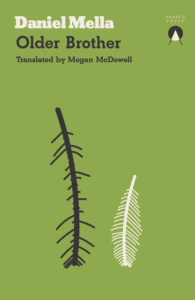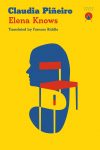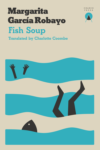
[Charco Press; 2020]
Tr. from the Spanish by Megan McDowell
People love to compare grief. For that reason, we are primed to classify works in the ever-growing canon of grief literature. There are prolonged deaths and sudden deaths. Deaths of a child, parent, friend, partner, or sibling. There are the deaths of the old and deaths of the young. Memoirs of one’s own death and memoirs of another’s death. More so than any other subgenre, our reading preferences in grief literature depend on our personal experiences with death. Will this book express a grief unknown to us, or remind us of something we’ve already felt? The book’s specs often provide an answer: Older Brother is an autofictional account of a sudden death (by lighting), of Alejandro (31), as told by his older brother, Dani (37).
Daniel Mella (b. 1976) is a celebrated Uruguayan novelist. Megan McDowell, a prolific translator of Spanish-language literature, is the first to translate Mella’s work into English. McDowell typically takes on formally innovative works: Samantha Schweblin’s Fever Dream is written entirely in dialogue and Alejandro Zambra’s Multiple Choice is structured like an exam. While autofiction certainly isn’t new, Older Brother does have a formal quirk: Mella narrates his brother’s death and his family’s crisis in the future tense. Here he describes his parents learning of Ale’s death: “Marcos will give the news to my parents in the lair. He’ll lead them out there from the kitchen, interrupting the preparation of chicken stroganoff, my sons’ favourite food. He will ask them to sit down on the sofa. Mum will obey, Dad won’t: he’ll want to receive the news standing up, and he’ll start to grow impatient. I don’t remember what words Marcos will use.”
For Mella, grief supersedes chronological time as the ordering force of the universe. But this collapse of time, paradoxically, initiates the protagonist’s obsession with it. In McDowell’s translation, the first line is: “His death will fall on 9th February, always two days before my birthday.” Mella is not the first writer to fixate on the time of a loved one’s death. Most famous in this regard is Albert Camus’ opening of The Outsider: “Today, maman died” (“Aujourd’hui, maman est morte”). This sentence announces the protagonist’s fatal apathy — he views the time of his mother’s death and her death itself as equally important facts. Mella displays a similar tendency to intellectualize death by focusing on time. Throughout the book, he includes characters’ ages in parentheses when introducing them, as if to express how much their life is worth, or maybe, how far away from natural death they ought to be. But this obsession with time proves pointless. Even before his brother’s sudden death, Dani’s family had recently grieved Milena, his nine-month-old niece.
This sort of event reminds us how little control we ever had. But, as Mella shows, we spend our lives preparing to reassert control in situations like these. Dani does so by using future tense in his writing on Alejandro’s death. He makes himself omniscient, becoming prepared for, rather than stupefied by, this event. Dani’s parents perform a script they’d been composing for years:
They look stunned at how familiar they find the scene, and by the idea, still silent, that they’ve been practicing for this their whole lives. They know exactly what to say.
This is the worst thing that could have happened to them.
It’s what Mum says, bringing her hands to her face, as if the mask she’d been wearing was coming to life now, just as the performance was starting, just as it was beginning to smother her.
Grief offers a stage on which we can communicate our values and playact our personalities — in this sense it is a creative experience. Older Brother itself attests to grief’s power as a catalyst for creativity.
Yet, death doesn’t lift people onto a higher plane. They remain themselves. Crucially, Mella shows how self-involvement lives on even after a loved one dies. That Older Brother is about Dani (not his younger brother) is clear from the title. Within the text, Dani apprehends Ale’s death as an event within his own life: one with an anniversary close to his birthday, one that teases out all the other little losses he has recently endured. The reader quickly senses that Dani’s grief for his lost relationship with Brenda, the mother of his two children, is central.
Brenda, whom Dani calls “La Negra,” is dating another man. Though she and Dani amicably co-parent their young children, he is tormented that they can’t be together. Meanwhile, as Dani recounts his relationships with others, he reveals a perception of female partners as instruments that validate his intellect by displaying their lack of it. When Dani starts seeing Clara, he notes: “It had been a long time – over ten years – since I’d gone out with someone who had her own library.” A later exchange with Clara reads: “Somehow she always knew she stood to lose – after all, La Negra was the mother of my children. ‘After all, she’s the mother of my soul,’ I would correct her, as if there was even the slightest possibility she would understand me.”
Beyond the attitude of condescension, Dani’s stream of consciousness features disturbing moments of objectification: a description of his favorite type of porn, which features “faces worn down to the skull by poverty or addiction,” or the mention of a lover, whom he ghosted after her young son died but still sometimes thinks of when he wishes he could “give it to her up the arse until she can’t take it anymore.” These comments are casual. Maybe it’s the casualness that makes them so disturbing; the author, who is introspective about nearly everything else, didn’t consider them worthy of a second thought. But, just as Dani is obsessed with premonitions of death, the reader who senses violence throughout the book will feel both horrified and validated by the ending, surprised and not surprised to see the narrator’s violent thoughts transformed into action.
Because the author’s treatment of family in the aftermath of death is so self-aware, it’s surprising how little introspection there is on violence against women. Yet, the violence is palpable in both Dani’s reality and his fantasies. A critic for the Spanish website Oculta Lit described the original, El hermano mayor, as a book about a “crisis of masculinity.” Most readers and critics, however, have not mentioned this aspect of the book. Maybe readers are adept at ignoring misogynistic undercurrents in literature. Maybe, in this case, these undercurrents are worth overlooking in order to access Mella’s perspective on grief and family, or his formal innovativeness (the classic saving grace of prejudiced art). These aspects of the book are wonderful, but their beauty cannot be separated from this other ugliness. To be fair, Mella has been celebrated as a writer with unusual courage to face the grotesque. Older Brother succeeds in highlighting the ugly sides of grief, like how self-absorption lives on even when a loved one dies. But this writerly self-absorption, by legitimizing the condescension towards women that, in turn, legitimizes the violence towards them, is also the invisible engine of the book’s misogyny. Older Brother is certainly raw, and perhaps courageous for that reason;but without the courage to critique its prejudices, it loses its impact.
Fiona Bell is a literary translator and scholar of Russian literature from St. Petersburg, Florida.
This post may contain affiliate links.







